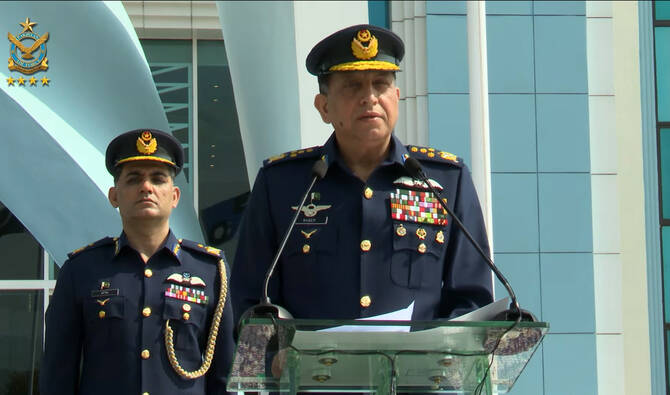RAWALPINDI: Aniqa Sattar walked around large piles of bed-shaped, rectangular spaces filled with manure, and covered with large straws of hay. She hunched over and thrust one hand into one of the beds and closely inspected what it held: a few wiggling worms burrowing through the dung.
Sattar is the co-founder of the Pakistani company Pak Organic Life in Rawalpindi produces nutrient-rich organic fertilizer via a process called vermicomposting. The process involves making worms devour manure. The nutrient-rich waste that worms excrete after eating manure— vermicompost— is used to boost crop health and yield.
Agriculture forms the backbone of Pakistan’s economy, contributing 21.4 percent to the South Asian country’s gross domestic product. It employs 45 percent of Pakistan’s labor force and contributes to the growth of other sectors of the economy. According to a report published this year by the Pakistan Business Council, Pakistan’s food crop yield has stagnated over the years while its population has increased rapidly, posing food insecurity dangers.
According to Sattar, vermicomposting does farmers a whole lot of good.
“It reduces their [farmers] water consumption [by] about one-third and the taste of their vegetables, their fruits, whatever they are producing, it is enhanced,” Sattar told Arab News this week.

Aniqa Sattar, co-founder of the Pakistani company Pak Organic Life, treats manure dumped into an open field for vermicomposting in Rawalpindi, Pakistan, on September 23, 2023. (AN Photo)
According to data by the Food and Agriculture Organization (FAO) Pakistan, the South Asian country uses over 155 kilograms of conventional fertilizers per hectare and has a total cropped area of 23.3 million hectares. With such a large cropped area to fertilize, it only helps that the vermicompost is cheaper compared to conventional fertilizers: it costs Rs45 ($0.16) per kilogram while a fertilizer costs Rs300 ($1.05) per kilogram.
But the process involves labor and takes months to complete.
Vermicomposting begins by first treating the animal waste, which Sattar’s company collects from farmers around Rawalpindi’s surrounding areas and dumps into an open field. The waste is sprayed with water for two weeks before it is spread into beds and the earthworms are added to it.
“The worms eat the manure and they convert it into a very nutrient-rich thing,” Sattar explained. “It takes the complete dung to be converted into the vermicompost after a process of about two to three months,” she added.
There are plenty of worms to go around, as Sattar’s company owns about 5,000 kilograms of them. For farmers who aspire to start their own business of producing vermicompost, she sells them worms for Rs5,000 ($17.5) per kilogram. Her company is currently rearing over two tons of worms per month and plans to increase it further in the coming months.
The bulk of the company’s customers are from Pakistan’s southern Sindh province, including the cities of Karachi and Hyderabad.

Aniqa Sattar, co-founder of the Pakistani company Pak Organic Life packs organic fertilizer in a plastic bag in Rawalpindi, Pakistan on September 23, 2023. (AN Photo)
“Our customers are purchasing it [vermicompost], most of them have their own gardens, or they own some land on which they are producing something like food, vegetables, “Sattar shared. “The yield is increased [by the vermicompost] by about 10-15 percent.”
And if they were using vermicompost, Sattar said farmers wouldn’t need to use different fertilizers on their crops.
“Here in vermicompost, we have all the 17 plant nutrients in the same fertilizer,” she said. “We don’t have to go for any second option.”
Abbas Ali, the manager of a plant nursery in Rawalpindi, has been using vermicompost for his seedlings and plants for the last two to three months.
“At the moment, thanks to God, we are using the fertilizer on seasonal seedlings and the result is very good,” Ali told Arab News as he planted cabbage seeds in a flowerpot.
Pakistan’s government has been educating farmers about vermicomposting through the National Agricultural Research Center (NARC) in Islamabad. Here, scientists train farmers on vermicomposting and how to rear earthworms.
“We are promoting this technology to end users because it is entrepreneurship at the house level,” Dr. Tariq Sultan, director of NARC Land Resources Research Institute in Islamabad, told Arab News.
Sultan said he always recommended people start vermicomposting from a “small level” with a few worms and then increase it gradually. He said the process also reduces global warming as it triggers carbon sequestration.
And in times of staggering inflation, Sultan thinks vermicomposting could be very good for business.
“It is a very profitable business because at the time fertilizer rates are very high,” he said. “It is a high need of the time that this technology should be promoted in Pakistan.”












